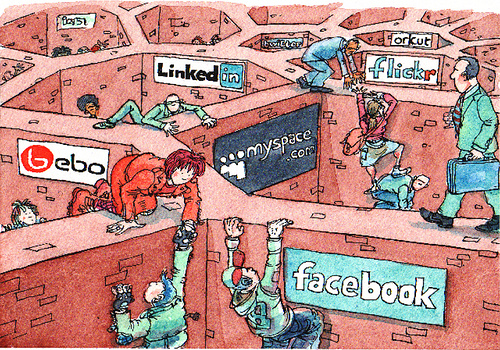
Watching Sir Tim ask the audience at TED shout RAW DATA NOW may be a bit much, but I thought back to the talk this weekend as I went through an exercise that had me cursing for integration. I wonder if you have ever had these experiences:
- You look at an address on Google Maps and get directions. Later, you do the same on your phone, and when I finally get to the car I plug it all into the built in car GPS (or Sat Nav for my British mates, which is more correct, but still sounds funny to me).
- You find a new TV show that you like and think about buying a season pass on iTunes. You try to remember about this when at home so you can tell your DVR to just record the bugger, so you skip the iTunes $. However, your DVR fills up with kids shows just before the actual showing, and thus you have to go back to iTunes and grab the show.
- You drive yourself nuts with your calendar as you try to share an item that is on your work calendar with the wife, and you end up with duplicates, and your calendar program isn’t smart enough to merge the darn items
- FriendFeed nicely sucks in your delicious tagging and you try to work out how to also get it to Twitter and you run around chasing your tail as you try to work out who will aggregate whom, and how
- You have an email alias that you send photos from your phone too, hoping to put them in the right places (Flickr!, Facebook, etc). Facebook then turns around and tells you “sorry, if you are using an iPhone use our Facebook application and you curse as the point is that you don’t want to do something different for each service! I still keep the Facebook alias and email it every time just because I am mad at the buggers.
You could go on and on with this list. Once you think about it, as you go throughout your day you find that you are repeating yourself again and again. I want to say “I like this URL” once, and have anyone who cares know that (delicious, FriendFeed, Facebook, Twitter). I want to say “I want to see this show” and have it waiting for me at home on the TV, or on my computer via iTunes, and on my iPhone. My intent is there, I consume it wherever.
The real battle of the “social Web” isn’t just about where your put your friends or eye balls, but where your data lives. Is one centralized source going to “win”? That sounds pretty darn scary doesn’t it. Even if that source was always a “good guy” (a big leap) they will always do something that doesn’t let you work on the data the way you wish (e.g. Facebook changing their mind on how to accept photos and blocking email).
I want to take control of my data. I then want to let services use it as *I* wish. I may lease out a service to someone who does a great job and who also has top notch policies and APIs for import/export. Lot’s of small players feels a lot better than the walled gardens of some of the social networks.
This is where Weave has me excited. Right now it may look like an experiment on sync, but what if it could be my broker. It feels different because Weave is a very different beast. You own your data. The browser can be your broker. The server can be a dumb bucket and if the client is encrypting it doesn’t even know what it stores in its buckets, let alone dip in to sell ads and make money off of the data that it knows about you, your connects, and your habbits.
It seems quite obvious that the future will be a lot more usable as we work out how this integration thing can actually work out. How do the business models fit in this world. Once industries see this new world as an opportunity instead of hanging on to their old models, the walls will break down and users will be free and have ownership. I would be happy to have micropayments happening constantly as I move around my data.
When this all happens, will a company or two own the experience? Or will you. That makes me want to shout RAW DATA NOW too, Tim.


April 17th, 2009 at 9:47 am
I wrote about something similar last year (client side storage, peer-to-peer social networking, http://timepedia.blogspot.com/2008/05/decentralizing-web.html)
My basic idea then was “Gear-to-Gear” social networking, using federated rendezvous servers. Store all your social data locally in the browser, but encrypt it and replicate it across several rendezvous servers, which are simple publish and subscribe mailbox queues. Other users can obtain access to your data by posting a encrypted friend request to your queue. The next time your gears client syncs, you process the queue. If you agree to friend someone, you encrypt the profile information you want him to have, and deposit it in his mailbox queue where he’ll get it on next login. Activity feeds would simply be another round-robin queue (with a different broadcast encryption technique)
The only potential gatekeeper bottleneck in the system is the rendezvous servers and how to discover them. But fundamentally, nothing more is needed than the ability to update an address book, queue up activities, and sync to the cloud, but some encryption protocols. That’s why I don’t get caught up in the hype of Facebook, et al, because to me, this phase is merely a bubble. These things are glorified commodities that sooner or later will be vastly simplified to a fundamental network platform that no one can own.
April 20th, 2009 at 2:25 am
Users should not have to remember what data they’ve entrusted to what companies in order to perform some operation on their data.
People should be able to consume data and republish with ease (no post or sync required). I agree with P2P federation in the browser — and I think it would be good to enable clients to act both as clients and servers. Any web application with permissions should be able to access any of my local data while my computers are up and running (and most people have at least one or two).
I’m curious why browsers didn’t get into the business of collecting and hosting user data earlier.
August 6th, 2009 at 7:23 am
You might also be interested to see Rufus Pollock’s original post on this on the Open Knowledge Foundation blog [1] – which Tim Berners-Lee cites as the origin of the “Raw Data Now” meme [2].
[1] http://blog.okfn.org/2007/11/07/give-us-the-data-raw-and-give-it-to-us-now/
[2] http://www.w3.org/2009/Talks/0204-ted-tbl/#(34)